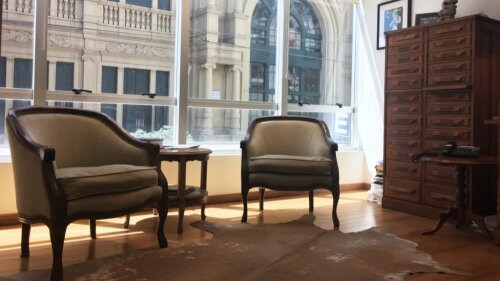Best Legal Document Lawyers in Córdoba
Share your needs with us, get contacted by law firms.
Free. Takes 2 min.
List of the best lawyers in Córdoba, Argentina
About Legal Document Law in Córdoba, Argentina
Córdoba is a province in Argentina where private-law documents and public instruments play a central role in daily legal transactions. The national Código Civil y Comercial de la Nación governs many substantive matters related to contracts, family law, inheritance and obligations, while procedural and certain regulatory matters may be subject to provincial rules in Córdoba. Notaries - escribanos - and registries have a decisive role for many documents, such as deeds, powers of attorney and wills that must be executed as public instruments. For documents intended for use abroad, Argentina is a party to the Hague Apostille Convention and apostilles are commonly required. If you need to prepare, authenticate, register or challenge a legal document in Córdoba, understanding which form the document must take and which public office must intervene is essential.
Why You May Need a Lawyer
People seek a lawyer for legal documents for many reasons. Common situations include:
- Buying or selling real estate - preparing and reviewing the escritura pública, checking the Registro de la Propiedad Inmueble and clearing title issues.
- Creating or updating a will - ensuring the document is valid, reflects your wishes and avoids later disputes.
- Granting powers of attorney - drafting a precise poder to permit actions locally or abroad, including limited or special powers.
- Family law documents - agreements on separation, child custody arrangements and property regimes between spouses or partners.
- Business formation and commercial contracts - drafting bylaws, shareholder agreements, contracts and ensuring compliance with local registration rules.
- Administrative and tax matters - preparing documents required by AFIP, provincial tax authorities and other agencies.
- Authenticating documents for foreign use - obtaining an apostille and, if required, certified translations by a traductor público.
- Disputes over documents - contesting alleged forgeries, challenging the validity of an instrument or enforcing rights based on a document.
Local Laws Overview
The following are key legal features to understand when dealing with legal documents in Córdoba:
- National civil and commercial law - The Código Civil y Comercial de la Nación sets rules on contracts, obligations, family law and succession. These rules apply across Argentina and will often determine the substantive validity of documents.
- Notarial public instruments - Many important documents must be executed as escritura pública before an escribano. Escribanos are legally qualified lawyers-public officers who authenticate signatures, certify facts and prepare public deeds.
- Registries - Property, commercial and civil registries are essential to make certain documents effective against third parties. For example, real estate transfers must be registered with the Registro de la Propiedad Inmueble corresponding to the property.
- Provincial regulations - Córdoba has provincial procedures and fees for registries, local taxes and administration that affect timing and costs of document processing.
- Authentication and apostille - For documents to be used abroad, a Hague apostille may be required. Apostilles confirm the authenticity of the issuing official and are issued by designated authorities.
- Electronic documents and digital signatures - Argentine law recognizes digital signatures and electronic documents under specific requirements. For some public instruments, however, traditional notarial form is still required.
- Professional regulation - Lawyers must be admitted and matriculated in a barra or Colegio de Abogados, and notaries belong to the Colegio de Escribanos de la Provincia de Córdoba. These bodies regulate ethics, fees and professional conduct.
Frequently Asked Questions
Do I always need a notary to make a document legally valid in Córdoba?
Not always. Many private agreements can be valid when signed privately by the parties. However, documents that affect third parties - such as real estate transfers, mortgages, certain powers of attorney and many wills - often require a public instrument executed by an escribano. A lawyer or notary can tell you which form is needed for your situation.
How do I check the ownership and encumbrances on a property?
You should request a certified extract from the Registro de la Propiedad Inmueble where the property is registered. A lawyer or escribano usually does this as part of a due diligence process before purchase, to confirm the owner, identify liens, mortgages and other restrictions.
What is a poder - power of attorney - and when is it necessary?
A poder is a document by which one person authorizes another to act on their behalf. It is useful when you cannot be physically present to sign transactions, to manage property, or to handle administrative procedures. For some acts, a public power of attorney before a notary is required or preferable to ensure acceptance by banks and registries.
How do I make a valid will in Córdoba?
A valid will can be made in several forms, but the safest approach is a escritura pública before an escribano or a holographic will complying with formalities set by law. A lawyer can help ensure the will complies with inheritance rules and minimizes the risk of challenges.
Can I use a document signed in another country in Córdoba?
Often yes, but foreign documents usually require an apostille or legalization to be accepted in Argentina. In many cases a certified translation by an official traductor público will also be necessary. Requirements depend on the nature of the document and the country of origin.
How do I verify a lawyer or notary is licensed in Córdoba?
Lawyers should be matriculated with the Colegio de Abogados de la jurisdicción where they practice, and notaries with the Colegio de Escribanos de la Provincia de Córdoba. You can request their matriculation number and verify it with the relevant professional body.
What fees should I expect to pay for preparing legal documents?
Fees vary by complexity and by professional. Notary fees for public deeds are often subject to regulated scales, while lawyer fees depend on the lawyer, the transaction and whether ongoing representation is needed. Request a clear written fee estimate or engagement letter before work begins.
How long does it take to register a deed or other public document?
Timing depends on the registry workload, completeness of the documentation and whether taxes and fees are paid. Simple registrations can take days to weeks; more complex matters, such as resolving title issues, can take longer. Your lawyer or escribano can give an estimated timeframe.
What if I suspect a document is forged or was signed under pressure?
Contact a lawyer immediately. You may file a civil action to annul the document and, if criminal conduct is suspected, report the matter to police or the public prosecutor for possible investigation of fraud, coercion or forgery. Preserve original documents and any evidence of coercion.
Can I prepare legal documents online or use electronic signatures?
Argentina recognizes electronic signatures under specific rules, and many administrative procedures have online options. However, some documents - particularly those requiring a public deed or enrolment in a registry - still require physical presence before an escribano or compliance with formal notarial electronic procedures. Ask a lawyer whether an electronic form will be accepted for your specific document.
Additional Resources
- Colegio de Abogados de la Provincia de Córdoba - professional body for lawyers in the province.
- Colegio de Escribanos de la Provincia de Córdoba - regulator and resource for notarial practice and public deeds.
- Registro de la Propiedad Inmueble de Córdoba - where property titles and encumbrances are registered.
- Dirección General de Registro Civil de la Provincia de Córdoba - civil records for births, marriages and deaths.
- Ministerio de Relaciones Exteriores, Comercio Internacional y Culto de la Nación - national authority involved with apostilles and documents for foreign use.
- Administración Federal de Ingresos Públicos - AFIP - for federal tax and fiscal documentation requirements.
- Dirección General de Rentas de la Provincia de Córdoba - for provincial tax matters linked to transactions.
- Provincial consumer protection office and municipal ombudsman - for disputes involving consumer contracts or local administrative matters.
- Colegio de Traductores Públicos - for certified translations required for use of documents in other languages.
Next Steps
- Identify the document you need - name the purpose, the parties involved and whether it must be registered or used abroad.
- Gather basic supporting papers - identity documents, title certificates, previous contracts, death or marriage certificates if relevant.
- Contact a local lawyer or escribano - check matriculation numbers and ask for an engagement letter with scope, timeline and fees. If the matter is notarial, approach an escribano familiar with the relevant registry procedures.
- Request a written cost and timeline estimate - include taxes, registration fees and any translation or apostille costs if the document will be used overseas.
- Proceed with due diligence - for property or business matters, have the professional check registries and verify encumbrances before signing.
- Execute and register - follow the notary and registry steps precisely to ensure the document is valid and opposable to third parties.
- Keep originals and certified copies - store them safely and provide certified copies when required for administrative procedures.
If you are uncertain at any stage, seek an initial legal consultation so a qualified professional can advise on the specific formalities and risks for your case in Córdoba. Legal processes vary by situation and timely legal advice helps avoid costly errors.
Lawzana helps you find the best lawyers and law firms in Córdoba through a curated and pre-screened list of qualified legal professionals. Our platform offers rankings and detailed profiles of attorneys and law firms, allowing you to compare based on practice areas, including Legal Document, experience, and client feedback.
Each profile includes a description of the firm's areas of practice, client reviews, team members and partners, year of establishment, spoken languages, office locations, contact information, social media presence, and any published articles or resources. Most firms on our platform speak English and are experienced in both local and international legal matters.
Get a quote from top-rated law firms in Córdoba, Argentina — quickly, securely, and without unnecessary hassle.
Disclaimer:
The information provided on this page is for general informational purposes only and does not constitute legal advice. While we strive to ensure the accuracy and relevance of the content, legal information may change over time, and interpretations of the law can vary. You should always consult with a qualified legal professional for advice specific to your situation.
We disclaim all liability for actions taken or not taken based on the content of this page. If you believe any information is incorrect or outdated, please contact us, and we will review and update it where appropriate.









